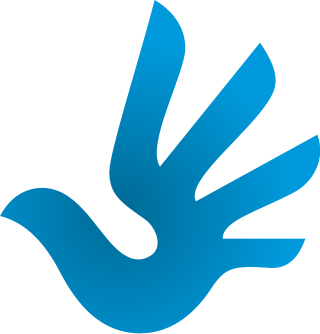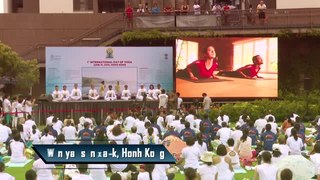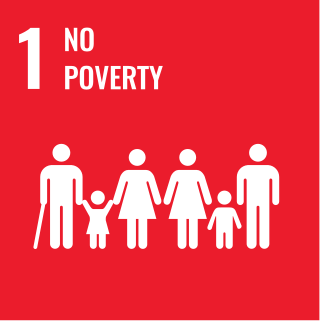
Extreme poverty, deep poverty, abject poverty, absolute poverty, destitution, or penury, is the most severe type of poverty, defined by the United Nations (UN) as "a condition characterized by severe deprivation of basic human needs, including food, safe drinking water, sanitation facilities, health, shelter, education and information. It depends not only on income but also on access to services". Historically, other definitions have been proposed within the United Nations.

The United Nations (UN) is an intergovernmental organization whose stated purposes are to maintain international peace and security, develop friendly relations among nations, achieve international cooperation, and be a centre for harmonizing the actions of nations. It is the world's largest and most familiar international organization. The UN is headquartered on international territory in New York City, and has other main offices in Geneva, Nairobi, Vienna, and The Hague.

The United Nations High Commissioner for Refugees (UNHCR) is a United Nations agency mandated to aid and protect refugees, forcibly displaced communities, and stateless people, and to assist in their voluntary repatriation, local integration or resettlement to a third country. It is headquartered in Geneva, Switzerland, with over 17,300 staff working in 135 countries.

The Millennium Development Goals (MDGs) were eight international development goals for the year 2015 that had been established following the Millennium Summit of the United Nations in 2000, following the adoption of the United Nations Millennium Declaration. These were based on the OECD DAC International Development Goals agreed by Development Ministers in the "Shaping the 21st Century Strategy". The Sustainable Development Goals (SDGs) succeeded the MDGs in 2016.

Human Rights Day is celebrated annually around the world on 10 December every year.

The International Day of Peace, also officially known as World Peace Day, is a United Nations-sanctioned holiday observed annually on 21 September. It is dedicated to world peace, and specifically the absence of war and violence, such as might be occasioned by a temporary ceasefire in a combat zone for humanitarian aid access. The day was first celebrated in 1981 and is kept by many nations, political groups, military groups, and people.

Vuk Jeremić is a Serbian politician and diplomat who served as the president of the United Nations General Assembly from 2012 to 2013 and as the Minister of Foreign Affairs of Serbia from 2007 to 2012.
The Declaration on the Rights of Indigenous Peoples is a legally non-binding resolution passed by the United Nations in 2007. It delineates and defines the individual and collective rights of Indigenous peoples, including their ownership rights to cultural and ceremonial expression, identity, language, employment, health, education, and other issues. Their ownership also extends to the protection of their intellectual and cultural property. The Declaration "emphasizes the rights of Indigenous peoples to maintain and strengthen their own institutions, cultures and traditions, and to pursue their development in keeping with their own needs and aspirations." It "prohibits discrimination against indigenous peoples," and it "promotes their full and effective participation in all matters that concern them and their right to remain distinct and to pursue their own visions of economic and social development".

The year 2008 was declared the International Year of Sanitation by the United Nations in conjunction with the Water for Life Decade.
World Humanitarian Day is an international day dedicated to recognize humanitarian personnel and those who have died working for humanitarian causes. It was designated by the United Nations General Assembly as part of a Swedish-sponsored GA Resolution A/63/L.49 on the Strengthening of the Coordination of Emergency Assistance of the United Nations, and set as 19 August. It marks the day on which the then Special Representative of the Secretary-General to Iraq, Sérgio Vieira de Mello and 21 of his colleagues were killed in the bombing of the UN Headquarters in Baghdad.

Nelson Mandela International Day is an annual international day in honour of Nelson Mandela, celebrated each year on 18 July, Mandela's birthday. The day was officially declared by the United Nations in November 2009, with the first UN Mandela Day held on 18 July 2010. However, other groups began celebrating Mandela Day on 18 July 2009.
The Official Languages of the United Nations are the six languages that are used in UN meetings and in which all official UN documents are written. In the six languages, four are the official language or national language of permanent members in the Security Council, while the remaining two are used due to the large number of their speakers. In alphabetical order of the Latin alphabet, they are:

Rajinder Paul Loomba, Baron Loomba, is a philanthropist, founder and executive chairman of clothing company Loomba Group, and a member of the House of Lords.
The International Day of Happiness is celebrated throughout the world on 20 March. It was established by the United Nations General Assembly on 28 June 2012.
International Day of the Girl Child is an international observance day declared by the United Nations; it is also called the Day of Girls and the International Day of the Girl. October 11, 2012, was the first Day of the Girl Child. The observation supports more opportunity for girls and increases awareness of gender inequality faced by girls worldwide based upon their gender. This inequality includes areas such as access to education, nutrition, legal rights, medical care, and protection from discrimination, violence against women and forced child marriage. The celebration of the day also "reflects the successful emergence of girls and young women as a distinct cohort in development policy, programming, campaigning and research."

The International Day of Yoga has been celebrated across the world annually on June 21 since 2015, following its inception in the United Nations General Assembly in 2014. Yoga is a physical, mental and spiritual practice which originated in ancient India. The Indian Prime Minister Narendra Modi, in his UN address in 2014, had suggested the date of June 21, as it is the longest day of the year in the Northern Hemisphere and shares a special significance in many parts of the world.
The Declaration and Programme of Action on a Culture of Peace was adopted by the United Nations General Assembly on September 13, 1999. This occurred after ten months of negotiations in the context of preparations for the International Year for the Culture of Peace.
The following lists events that happened with or in collaboration with the United Nations and its agencies in the year 2019.

Sustainable Development Goal 1, one of the 17 Sustainable Development Goals established by the United Nations in 2015, calls for the end of poverty in all forms. The official wording is: "No Poverty". Member countries have pledged to "Leave No One Behind": underlying the goal is a "powerful commitment to leave no one behind and to reach those farthest behind first". SDG 1 aims to eradicate every form of extreme poverty including the lack of food, clean drinking water, and sanitation. Achieving this goal includes finding solutions to new threats caused by climate change and conflict. SDG 1 focuses not just on people living in poverty, but also on the services people rely on and social policy that either promotes or prevents poverty.

The United Nations response to the COVID-19 pandemic has been led by its Secretary-General and can be divided into formal resolutions at the General Assembly and at the Security Council (UNSC), and operations via its specialized agencies and chiefly the World Health Organization in the initial stages, but involving more humanitarian-oriented agencies as the humanitarian impact became clearer, and then economic organizations, like the United Nations Conference on Trade and Development, the International Labour Organization, and the World Bank, as the socioeconomic implications worsened.











